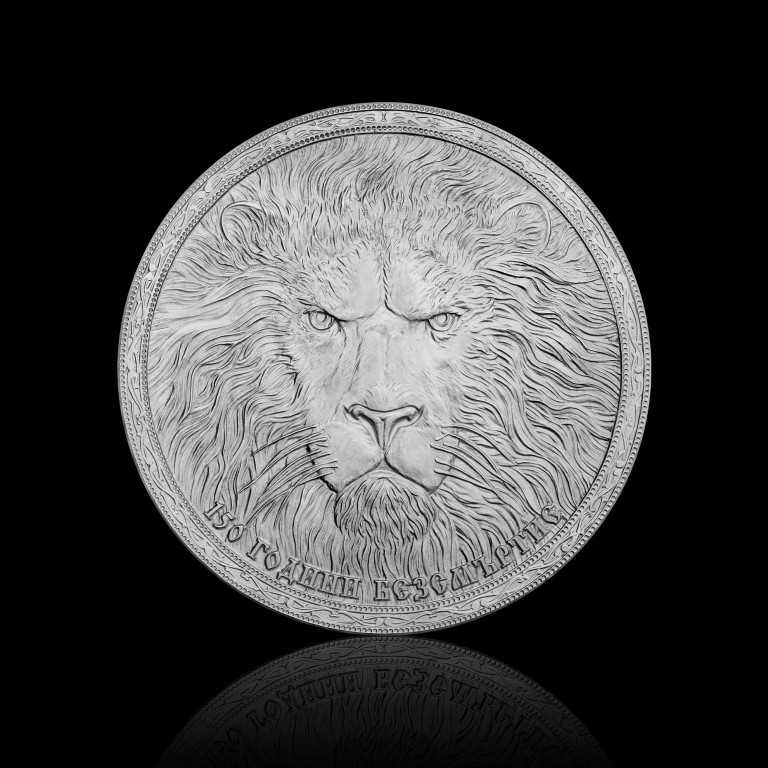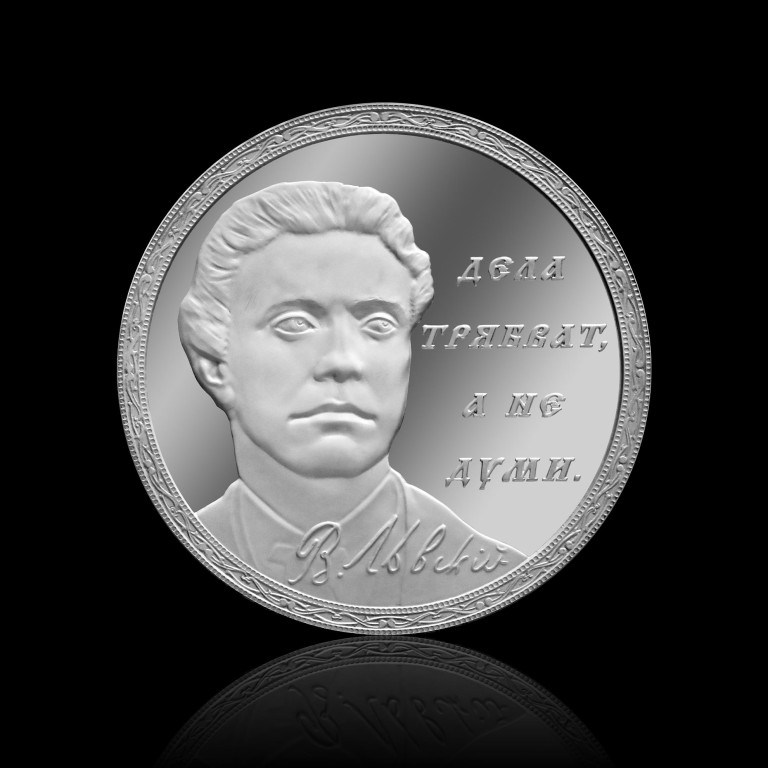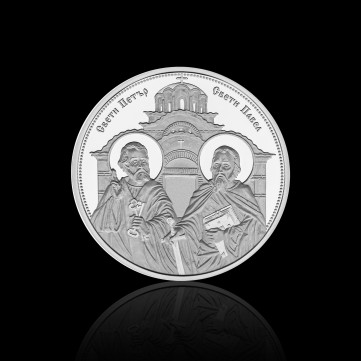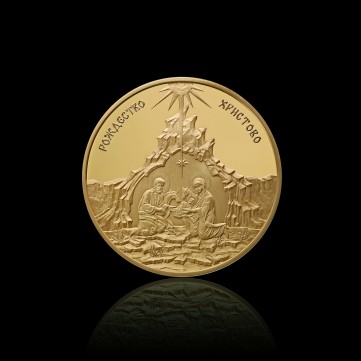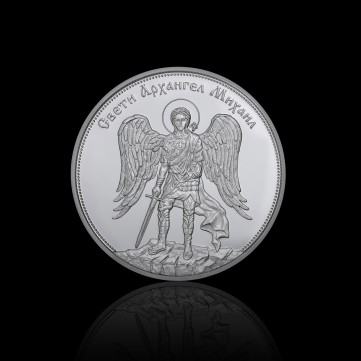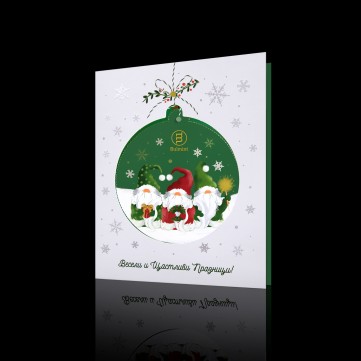“Vasil Levski - 150 Years of Immortality” Silver Medal, 15кг
49500.00 BGN / 25308,95 €In honour of one of the most monumental jubilees to the Bulgarian nation - 150 years since the death of the Apostle of Freedom - we created a monumental piece of modern medal work out of 999.9 silver, with an impressive diameter of 22 centimeters.
2023 marks 150 years since the death of Vasil Levski - and 150 years since the immortalization of his name into a symbol of courage, strength, and patriotism. His revolutionary ideology of a “Pure and sacred republic”, justice and equality as principles to aspire to resonate with us to this very day, and his legacy - his free spirit - continues to inspire our people generation after generation.
With one of our most ambitious projects to date - a stunning work of modern medal-making minted out of 15 kilograms of 999.9 fine silver with a diameter of 22 centimeters - we pay tribute to one of the most significant figures in Bulgarian history, his life’s work and his immense contribution to the Bulgarian Liberation movement. The piece debuted at the 50th edition of the World Money Fair as an example of Bulmint’s technological capabilities and expertise.
The obverse depicts a portrait of the Apostle of Freedom alongside the principle he lived by - “It is deeds that we need, not words.” The reverse bears the image of one of Bulgaria’s national emblems - the lion.
The medal comes in a luxury black wooden box, with a certificate of authenticity and a specialized protective capsule with a flat underside that allows it to be displayed standing. The piece is made-to-order, with a limited issue of 15 pieces.
Metal
Fine Silver
Weight
15 000
g
Purity
999.9/1000
Edging
Smooth
Quality
Proof
Circulation
15
pcs.
Diameter
220
mm
Vasil Levski was born in Karlovo under the name Vasil Ivanov Kunchev on July 6, 1837 (July 18 according to the Gregorian calendar). The death of his father severely impacted his family’s financial situation and, despite his young age, he took an active part in providing for them. At the age of 14 he became his uncle’s apprentice - Archimandrite Vasiliy, tax collector at the Hilandar Monastery in the Karlovo and Stara Zagora region, with whom he spent the next few years, continuing his education in Stara Zagora. It was his uncle who pushed him to join the clergy, even though the young Levski expressed a desire to further his education. On December 7, 1858 he became ordained as a monk at the “Saint Spas” Sopot Monastery, now under the name Ignatius, and a year later he became hierodeacon at the “Holy Mother of God” church in Karlovo. There he served for two years, but his continuous objections to the morality of his tax-collecting duties were a frequent point of contention between him and his uncle. In 1861 he made a decision - to join the Bulgarian Liberation movement. On March 3, 1862 he stole his uncle’s horse and, under the cover of night, with the help of friends and relatives, he left his hometown and headed for Belgrade to join the First Bulgarian Legion, led by Georgi Rakovski.
In Belgrade he took part in his first battle. Legend has it that this is where, through his agility and courage, he earned the moniker Levski (“lion”) - the name history remembers him by, along with the Apostle of Freedom. His early years as a revolutionary were heavily influenced by Georgi Rakovski - first by his call to the people to rise up against their oppressors through organized revolutionary efforts, and later by his idea to organize revolutionary committees in Bulgaria - ideas Levski would further develop.
He stayed in Serbia even after the dissolution of the First Bulgarian Legion in 1862. The next few months probably saw him in Bucharest, and in 1863 he returned to Bulgaria, where he was arrested for a short while - conflicting sources say it was either due to his participation in the Legion or, more likely, in response to his uncle’s report about his stolen horse. In 1864 in front of witnesses he shore his long hair - a symbol of his monastic station - and swore service to the people. This turned him into a social pariah and he had no choice but to leave Karlovo for good.
He spent the next couple of years working as a teacher in the nearby village of Voynyagovo, but parallel to that he ran a secret propaganda campaign, inspiring people the desire for liberation in the people - a campaign which does not go unnoticed by local law enforcement. He leaves the village and sets off for the Wallachia area, following the footsteps of Hadzhi Dimitar and Stefan Karadzha. He joined the Second Bulgarian Legion, but a serious illness forced him to withdraw from the military campaign and soon after the Legion is dissolved by the Serbian government.
The tragic loss of Hadzhi Dimitar and Stefan Karadzha cast a shadow on the plans to organize an uprising on Bulgarian soil, but Levski did not lose hope - letters to Panayot Hitov and Nayden Gerov show that, mere months later he was already strategizing and looking for supporters in the revolutionary efforts. The accumulated losses made him rethink the military tactics and brought him to the conclusion that the liberation movement could not rely on outside help and would have to be organized internally, by the Bulgarian people in the form of uprisings.
Thus began his first expedition around Bulgaria, on December 11, 1868. His goal was to research the political climate amongst the people and whether it was a suitable environment for the internal preparation of an uprising, as well as garner support. His campaign catches the attention of the Ottoman government, his identity is revealed, his known aliases are spread across the land as a threat to the empire. His gathered intelligence, though, seemed promising, and on February 24, 1869, he returned to Romania. Within a few months he began his second expedition and builds the foundations of what would become the Internal Revolutionary Organisation (IRO). This time he came to the conclusion that the people needed more preparation through organized revolutionary committees - IRO’s main instrument of operation.
By August that same year he once again went to Bucharest, where, together with Lyuben Karavelov, he co-founded the Bulgarian Revolutionary Central Committee (BRCC).
In May 1870 he returned to Bulgaria and continued his work in organizing a network of committees - and by 1871 those efforts bore fruit. The Lovech Private Revolutionary Committee was declared Central and became a link between the internal revolutionary efforts and the members of the movement outside the borders. Levski then put into effect one of his ideas - that the upper class needed to be included in the revolution and provide financial support - willingly or under pressure from the freedom fighters. The liberation movement grew and attracted more allies and active participants, a deal with the Serbian government was struck.
A number of events throughout the latter half of 1872 led to the capture and eventual execution of Vasil Levski.
A mission to acquire funding from a member of the Lovech upper class led to the tragic murder of one of his servants. In the ensuing chaos, Levski is seen by a large crowd of passersby, among which were members of the local law enforcement. This incident later makes Levski’s sentence heavier.
In September of that same year, a botched robbery of a postal carriage - one Levski was adamantly against, but ultimately in the minority - led to the capture of all participants. Their confessions identify multiple members of the BRCC and give the Ottoman government their first physical description of Levski and information about where he might be next - something he was not aware of during his next trip from Lovech to Wallachia.
The made-to-order “Vasil Levski - 150 Years of Immortality” Silver Medal, 15kg will be manufactured within 20 business days of the successful processing of the buyer’s down payment. The shipment will then be transported by Bulmint’s armored vehicle to any location in Bulgaria.
Storage of investment products and medals with numismatic value
Owners of gold and silver products with the Bulmint brand should take into account some specific storage conditions. Gold and silver are precious metals, which are very soft and easy to bend/deform. The products must be kept in a place of low humidity where the temperature does not exceed 50 degrees Celsius, in order not to impair the integrity of the package. Please do not use a sharp object on the package or the product itself – you risk damaging it.
Product is out of stock
Enter your e-mail address and we will notify you when the product is back in stock.

